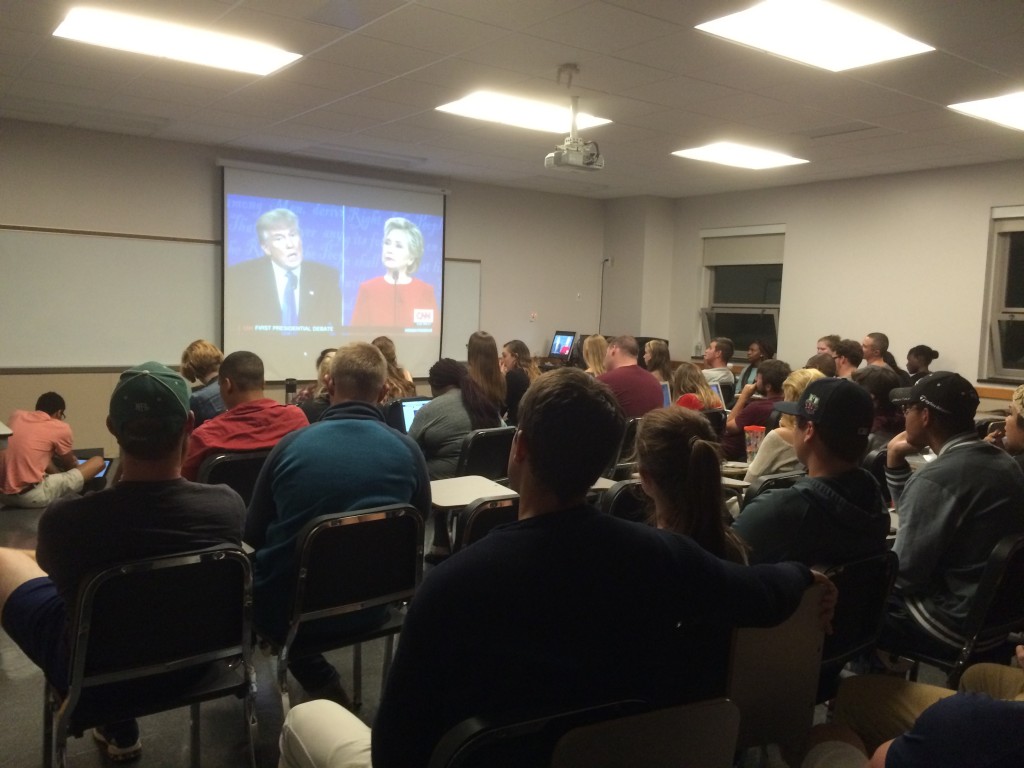On Monday, Sept. 26, a large crowd of Eastern students abandoned their nightly routines of homework and Netflix and went to a McInnis classroom to watch the first 2016 presidential debate between Hillary Clinton and Donald Trump. The event was held by Eastern’s political science honor society, Pi Sigma Alpha. Attendance was so high that a dividing wall between two classrooms had to be taken down in order to comfortably fit the approximately 100 students who showed up to watch Trump and Clinton discuss topics such as taxes, foreign policy in the Middle East and race relations in America.
More than 80 million viewers tuned in to watch the televised debate, setting a new record for presidential debate viewership. This record does not even include the vast number of people who watched from places other than their living rooms, including restaurants, bars and college campuses, so the actual number of viewers is even higher. Not only did a large number of Eastern students physically come to watch the debate, but it was clear that they were also actively engaged in the debate and interested in Clinton and Trump’s statements. Although it was stressed that each student should remain respectful to one another’s views throughout the debate, there was a clear sense of camaraderie in the occasional laughter and vocal responses that rang out in the classroom as Trump and Clinton debated each other on national television.
What do these surprising attendance statistics mean in a modern society that often assumes political apathy from its citizens? Furthermore, what does this say about the civic involvement of millennials (those born between 1982 and 2004), a generation often described as uninvolved and uninterested in politics? If the number of Eastern students interested in this presidential election is representative of millennials as a whole, then this generation could have a drastic impact on polls. According to the Pew Research Center, millennials’ political clout has recently become equal to that of the baby boomers (those born between 1946 and 1964). Both generations represent roughly 31 percent of the entire electorate, so not only is it interesting that college students appear particularly interested in the election, but they could also potentially affect who is elected president this fall.
But the key word here is “potentially.” Millennials may comprise a large proportion of the electorate, but that is merely an empty statistic if there is no follow-through come Election Day. So does this widespread interest in the presidential election mean that there will be a greater voter turnout on Election Day? Eastern political science professor Alexios Alexander hopes so: “The desire to watch this debate for many might be more akin to guiltily watching a car wreck and the aftermath, or the gladiators of Rome, a fascination that itself displays how wrong and unfortunate is the event being observed, and the reveling in it all the worse. My hope is that the fascination with this debate at some point gives rise to a call to conscience within the soul of most people watching…and that people do indeed turn out and vote their conscience.”
Dr. Alexander’s concern that our nation’s interest in debate is merely reflective of a desire to be entertained seems valid, especially when one takes into consideration that Pew statistics show that Clinton and Trump are two of the most unpopular presidential candidates the U.S. has ever had. Eligible voters from every generation seem to have remarkably strong feelings about the presidential candidates, which may explain the surprisingly large viewership among Eastern students and U.S. citizens in general. However, whether potential voters’ interest will remain this ardent throughout the rest of this electoral season is yet to be seen.
No matter who is sitting in the Oval Office come spring, this election is certainly remarkable, and has created plenty of space for intergenerational discussion and debate. Pi Sigma Alpha is going to continue to provide this space by hosting more political events throughout the semester, including another “Pizza and Politics” on-campus viewing party on Oct. 19.
Sources: Alexios Alexander, CNN, Pew Research Center
—————————————
The political science department will continue to foster political discussions at Eastern University by hosting several events:
A Truly Representative Debate: Assessing the Four Political Parties in the Presidential Election on Issues Important to Students: On Thursday, Oct. 20 at 7 p.m. in Baird Library, four political science students will each represent one of the presidential candidates in a debate.
Windows on the World: Christian Politics? Making Faithful Decisions in the Midst of Political Turmoil: This event will take place on Friday, Nov. 4. Sharon Gramby-Sobukwe, chair of the political science department, will be moderating.
Events in the Perspectives Series (co-sponsored by Student Development) include:
For the Masses or Masters: Is the Electoral College Democratic?: Drs. Alexander and Gramby-Sobukwe will debate on Monday, Oct. 24 at 7 p.m. in Baird Library.
Do Black Lives Really Matter? Who’s Responsible for Black Life? The Black Community? The Police?: Local speakers who hold various perspectives on these issues will participate in a roundtable discussion on Monday, Nov. 14 at 7 p.m. This event is hosted by several Eastern organizations.
Source: Sharon Gramby-Sobukwe

